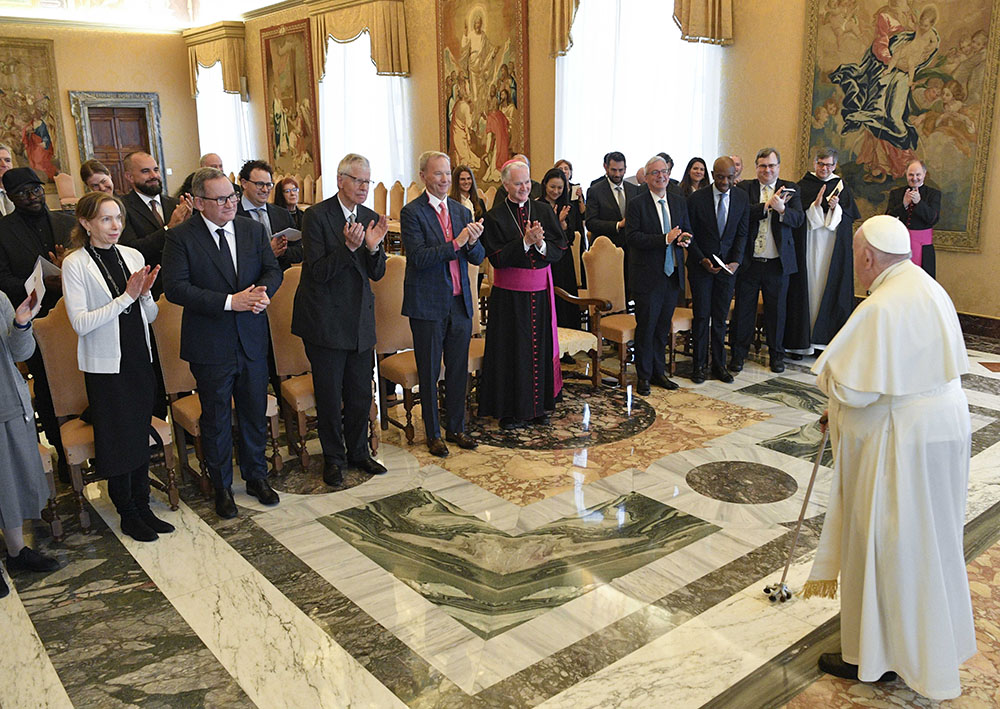
Pope Francis meets leaders from the tech industry at the Vatican March 27. The pope called for an "ethical and responsible" development of artificial intelligence. (CNS/Vatican Media)
Pope Francis on Dec. 14 called for a binding international treaty to regulate the development and use of artificial intelligence, saying that while new advancements could result in groundbreaking progress, they could also lead to a "technological dictatorship."
"The goal of regulation, naturally, should not only be the prevention of harmful practices but also the encouragement of best practices, by stimulating new and creative approaches and encouraging individual or group initiatives," said Francis.
The pope's request came in his message for the World Day of Peace, which is celebrated by the Catholic Church each year on Jan. 1. Each year the pope sends the document to heads of state and other global leaders along with his New Year's wishes. In addition, the pope typically gives an autographed copy of the document to high-profile Vatican visitors.
"Any number of urgent questions need to be asked. What will be the consequences, in the medium and long term, of these new digital technologies?" Francis asked in his six-page document on artificial intelligence. "And what impact will they have on individual lives and on societies, on international stability and world peace?"
The release of the pope's message comes just days after what was hailed as a landmark agreement within the European Union that provides the first global framework for artificial intelligence regulation.
At the same time, in the United States, a bipartisan group of lawmakers has been formed to consider what artificial intelligence guardrails might be necessary, though there is no clear timeframe for when such legislation may be considered. And in recent months, big tech entrepreneurs in Silicon Valley have been embroiled in a series of controversies over the future of artificial intelligence and what, if any, limits should be imposed on their own industry.
Advertisement
Similar to Laudate Deum, the pope's October 2023 apostolic exhortation on climate change, Francis uses his World Day of Peace message to issue a clarion call for a greater commitment to multilateral action to better regulate emerging technologies.
"The global scale of artificial intelligence makes it clear that, alongside the responsibility of sovereign states to regulate its use internally, international organizations can play a decisive role in reaching multilateral agreements and coordinating their application and enforcement," he writes.
While the document acknowledges that artificial intelligence could yield tremendous benefits for human development — among them innovations in agriculture, education and improving social connections — the pope offers a stern warning that it could "pose a risk to our survival and endanger our common home."
At a time when artificial intelligence is being used to execute the ongoing war in Gaza and is widely utilized in other armed conflicts, the pope sounds the alarm that the use of such technology could not only fuel more war and the weapons trade, but make peace further unattainable.
"The ability to conduct military operations through remote control systems has led to a distancing from the immense tragedy of war and a lessened perception of the devastation caused by those weapon systems and the burden of responsibility for their use," he writes.
"Autonomous weapon systems can never be morally responsible subjects," he continues. "It is imperative to ensure adequate, meaningful and consistent human oversight of weapon systems. Only human beings are truly capable of seeing and judging the ethical impact of their actions, as well as assessing their consequent responsibilities."
Among the other admonitions Francis offers is an overreliance on technology for language-processing tools, surveillance and security. Such products and innovations, he warns, raise serious questions about privacy, bias, "fake news" and other forms of technological manipulation.
At a Dec. 14 Vatican press conference, Jesuit Cardinal Michael Czerny — a close collaborator of Francis — said that the pope is "no Luddite" and celebrates genuine scientific and technological progress. But he warned that artificial intelligence is a high-stakes gamble and that such digital technologies rely on the individual and social values of their creators.
"We should not liken techno-scientific progress to a 'neutral' tool such as a hammer: whether a hammer contributes to good or evil depends upon the intentions of the user, not of the hammer-maker," said Czerny, who heads the Vatican's Dicastery for Promoting Integral Human Development.
Barbara Caputo, who teaches at the Polytechnic University of Turin and directs the university's Hub on Artificial Intelligence, called for greater technical training on artificial intelligence that is inclusive of men and women from all over the world, rather than select elites.
"Artificial intelligence will be true progress for humanity only if its technical knowledge in-depth will cease to be the domain of the few," she said. "The Holy Father reminds us that the measure of our true humanity is how we treat our most disadvantaged sisters and brothers."
In summary, writes the pope in the new document, "artificial intelligence ought to serve our best human potential and our highest aspirations, not compete with them."
"Technological developments that do not lead to an improvement in the quality of life of all humanity, but on the contrary aggravate inequalities and conflicts, can never count as true progress," Francis warns.








